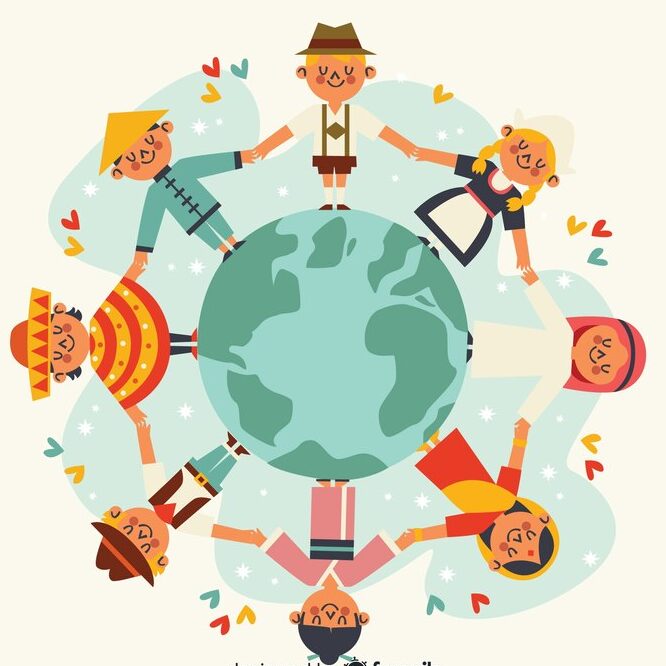Relocating to a new country is a transformative experience, offering opportunities for personal growth, professional advancement, and cultural exchange. However, for immigrants and expatriates, the challenge often lies in striking a balance between maintaining cultural heritage and integrating into a new society. Whether for work, education, or family, adapting to a different cultural environment does not mean abandoning one’s roots—it involves finding ways to preserve traditions while embracing new influences.
This article explores the complexities of cultural identity maintenance, the challenges of assimilation, and the strategies for successfully balancing both worlds.
The Importance of Cultural Identity
Culture is more than just traditions, language, or festivals—it shapes values, beliefs, and social interactions. For immigrants, retaining cultural identity is vital because it:
- Preserves a Sense of Belonging – Cultural heritage provides a sense of continuity and connection to one’s homeland, family, and personal history.
- Strengthens Community Ties – Being part of an ethnic or cultural group in a foreign land fosters support networks and emotional stability.
- Enhances Self-Esteem and Mental Well-Being – Research shows that individuals who embrace their cultural background tend to experience less identity conflict and greater self-confidence.
- Provides Generational Continuity – Passing down traditions, language, and values ensures that future generations remain connected to their roots.
However, while maintaining cultural heritage is important, overcoming barriers to integration is equally crucial for success and well-being in a new country.
Challenges of Integration: Finding the Right Balance
While immigrants strive to hold on to their cultural roots, they also face the need to integrate into their host country’s social, economic, and political systems. This often presents several challenges:
1. Language Barriers and Communication Struggles
Language is a fundamental aspect of culture, and learning the dominant language of a new country is essential for employment, education, and social interactions. However, many immigrants fear that prioritizing a new language over their mother tongue may weaken their cultural identity.
Solution:
- Encourage bilingualism within families to ensure proficiency in both languages.
- Participate in community language programs that foster learning without alienating one’s native tongue.
2. Navigating Social Expectations and Cultural Differences
Social norms, etiquette, and traditions can vary drastically between cultures. For example, in Western societies, individualism is emphasized, whereas many Asian and Middle Eastern cultures value collectivism. These differences can lead to culture shock and social misunderstandings.
Solution:
- Observe, adapt, and ask questions when encountering unfamiliar customs.
- Educate locals about one’s own cultural practices to promote mutual understanding.
- Engage in cultural exchange activities to find common ground.
3. Facing Discrimination and Stereotyping
Prejudice and discrimination can make integration emotionally challenging. Many immigrants struggle with being stereotyped or feeling excluded because of their accent, attire, or traditions.
Solution:
- Build a strong support network within both the immigrant and local communities.
- Seek organizations that advocate for cultural diversity and inclusivity.
- Participate in public discourse to challenge misconceptions.
4. Passing Cultural Values to Future Generations
For many immigrants, ensuring that their children maintain cultural ties while adapting to a new environment is a major concern. However, younger generations, often influenced by peer pressure and societal expectations, may struggle with identity conflicts.
Solution:
- Create a culturally rich home environment through language, cuisine, and storytelling.
- Involve children in cultural celebrations and heritage programs.
- Teach the historical significance of traditions to instill pride in their roots.

Strategies for Balancing Tradition and Adaptation
Successfully maintaining cultural identity while adapting to a new society requires a proactive approach. Here are some effective strategies:
1. Participate in Cultural Communities
Joining cultural associations, religious groups, or expat communities provides a sense of familiarity in a foreign land. These groups organize festivals, traditional events, and social gatherings, allowing individuals to stay connected to their heritage.
Examples:
- Indian expatriates in the U.S. celebrate Diwali, Holi, and Navratri through community events.
- Chinese immigrants in Canada maintain Lunar New Year traditions within Chinese cultural centers.
2. Adapt Traditions to a Modern Context
Cultural practices evolve over time. While it’s important to honor traditions, they can be adapted to fit contemporary lifestyles.
Examples:
- Incorporating fusion cuisine—mixing traditional flavors with local ingredients.
- Celebrating festivals in smaller, more flexible ways that fit busy schedules.
3. Educate Locals About Your Culture
Raising awareness about one’s traditions helps dispel stereotypes and fosters inclusivity.
Ways to Do This:
- Hosting cultural exchange programs at schools or workplaces.
- Sharing traditional recipes, music, or art with friends and neighbors.
- Engaging in discussions about cultural diversity and shared values.
4. Stay Open to New Experiences
Integration doesn’t require sacrificing identity—it means embracing new experiences while staying true to one’s roots.
Examples:
- Exploring local customs, festivals, and social norms with an open mind.
- Building friendships with people from diverse backgrounds.
- Finding similarities between one’s native culture and the new culture.
5. Maintain a Connection to Home
Technology makes it easier than ever to stay connected to one’s homeland.
Ways to Stay Connected:
- Regular video calls with family and friends.
- Watching movies, TV shows, and news in one’s native language.
- Visiting home whenever possible to reconnect with traditions firsthand.

Case Study: The Indian Diaspora’s Approach to Cultural Balance
Indians form one of the largest diaspora communities worldwide. Whether in the U.S., Canada, the UK, or the Middle East, they have found effective ways to balance tradition with integration:
- Education: Many Indian families encourage their children to learn both English and regional languages to maintain bilingual fluency.
- Cuisine: Indian food has gained global recognition, with immigrants modifying recipes to suit local tastes while preserving authentic flavors.
- Festivals: Indian festivals like Diwali, Holi, and Eid are now celebrated internationally, with local communities participating.
- Professional Success: Many Indians embrace Western corporate culture while upholding their cultural ethics, values, and work traditions.
This adaptive approach has allowed Indian immigrants to thrive in new environments without losing touch with their roots.
A Balanced Identity is a Strong Identity
Balancing tradition and integration is not about choosing one over the other—it is about creating a harmonious identity that embraces both heritage and modernity. By preserving cultural roots while being open to new influences, immigrants can successfully navigate the complexities of life abroad.In a globalized world, the ability to honor tradition while embracing change is a strength. Cultural identity is not static—it evolves with experiences, challenges, and opportunities. By finding a middle ground, individuals can thrive in multicultural environments without losing sight of where they come from.











